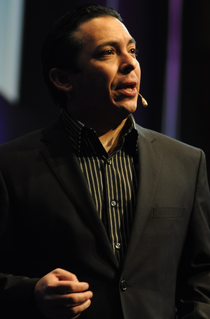Top 90 Democratization Quotes & Sayings - Page 2
Explore popular Democratization quotes.
Last updated on April 19, 2025.
The civil rights movement didn't deal with the issue of political disenfranchisement in the Northern cities. It didn't deal with the issues that were happening in places like Detroit, where there was a deep process of deindustrialization going on. So you have this response of angry young people, with a war going on in Vietnam, a poverty program that was insufficient, and police brutality. All these things gave rise to the black power movement. The black power movement was not a separation from the civil rights movement, but a continuation of this whole process of democratization.
Every story has a point of view and whether it's by what one chooses to include or exclude from a story or whether it's a very specific agenda that is pushed, there is no such thing as objective media. Once you realize that it's more than just a marketplace of ideas, it's a battleground of ideas that are suppressed and the ideas that are pushed forward in the mainstream media are the ones that independent media has a chance to address. I think that the democratization of media in that way can be very helpful in allowing the truth to come out in a way that it might not on CNN or FOX.
As things change in Turkey people find in religious observance a certain framework of safety, of continuity. This is quite a common phenomenon. In a strange way it's part of a democratization of society. Although religious observance seems more common these days, it's not that people who did not go to mosques have started to go to mosques. I don't know anyone in Turkey who's become a born-again Muslim. It's a question of individual choice, and it does not stop the organic secularization of Turkish society, which carries on regardless.
I wouldn't call it naive but silly. History does not work like this. If you look at the dynamics of Eastern Europe or even Germany post reunification, you realize that change takes time. No one can deny the fact that we are still not there - I am advocating something which has to go from uprisings to revolutions. It is not coming straight away that it is not going to come but what we have to advocate is that the democratization process is always better than state dictatorship.
Even after the whole democratization process, it's quite clear that the United States are not seen in a positive way in all the Muslim-majority countries - in Egypt, in Libya, even in Tunisia - even though we have now a kind of trying to be recognized as democrats by the Islamists who are running, you know, Tunisia and Egypt. But the popular sentiment is very, very negative.
In the past, Being able to follow what you're naturally "should" be good at was limited to a very few people in a country like the United States, It was white men who basically had the privileges - or, you name whatever country it is, there's some group of elites who, through various processes of democratization and things like the internet and the information that's available. It's exploding!
The inherent non-linearity of the digital allows for more input from others, including the subject and reader as collaborators. The top-down, bedtime-style story is of limited use. A non-linear narrative that allows for increased complexity and depth, and encourages both subject and reader to have greater involvement, will eventually emerge more fully from the digital environment. This, in a sense, is the more profound democratization of media.
I think in the old music, everything was so competitive. It was all about - very selfish in a lot of ways. The label sort of capitalized on that desperation and that competition. In the new music landscape, with is the democratization of the internet and music in general, I think it can be a lot more collaborative. People, instead of competing, they can actually support each other, in music.
In the minds of many Western politicians, military interventions and air strikes appear to have become legitimate policy tools since the NATO attacks on Yugoslavia during the 1990s. That's how they intend to bring everyone into line who don't share the Western view of democratization of society and the liberalization of the economy. But there is no future for that kind of globalization.
For so long, companies were run using a command-and-control, 'top down' hierarchical method that involved dictating down the command chain and maintaining order. What I've witnessed in our time is evolving democratization, a shift to a demand economy accelerated by technological advancements like social media.
I started as an engineer. I migrated to philosophy and international politics. And I did my studies about African - Africa democracy and democratization in Africa, taking Kenya as a model. And then, while I was doing so in 1996 in South Africa, Al Jazeera was established. So they requested me to be an analyst on African affairs.
In my childhood, and particularly when I take the responsibility, I already have sort of keen desire, we must change our system. Then as soon as we reach India, 1959, at once we start working for democratization. Now here if remain in a political sort of field, supreme leader, at the same time religious leader, that may become hindrance of proper democracy.
... we believe in the vocation of communion and participation of our people, who day to day awaken to their political conscience and express their desire for change and profound democratization of society. A change based on justice, built with love, and which will bring us the most anxiously desired fruits of peace.
Worker-owned co-ops, on their own, floating in the market, tend to replicate the behavior of worker-owned capitalists in some circumstances. They sometimes develop positive participatory schemes, sometimes not. We know from the studies of worker-owned plywood companies in the US, they can tend to develop conservative attitudes, not socialist attitudes. So even though I'm an advocate of further democratization of the workplace, we also need to be building larger structures.
I think a lot more people are able to take on a design challenge than ever before. And this was true 20 years ago when the desktop publishing revolution came about that allowed people with Macintosh's at home to produce professional-looking newsletters or publications for the first time. So, there's a long march toward more democratization for design.
Like most terms of political discourse, socialism has more or less, lost its meaning. Socialism used to mean something. If you go back far enough it meant basically control of production by producers, elimination of wage labor, democratization of all spheres of life; production, commerce, education, media, workers control of factories, community control of communities, and so on. That was socialism once. But it hasn't meant that for a hundred years. Socialism meant something different.




























